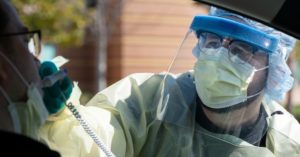
Shown wearing personal protective equipment in this photo, Daniel Mendoza spent more than seven years in the Army, both as a combat and flight medic. His military experience has proven invaluable during the novel coronavirus pandemic. He works at the VA Palo Alto, CA, Health Care System as an Intermediate Care Technician (ICT) in the emergency department. Photo from VAntage Point blog
WASHINGTON — According to VA leaders, the department will be better prepared if COVID-19 infections spike again in the fall, as many health experts are predicting it will. Officials laid the blame for early stumbles, such as austerity measures when it came to personal protective equipment (PPE), at the feet of the pandemic being a unique situation.
They also assured legislators that they would not make the same mistakes twice.
Holding the first partially in-person House hearing since the pandemic began, the House Appropriations Committee’s Subcommittee on Military Construction, Veterans Affairs, and Related Agencies grilled VA Secretary Robert Wilkie and other agency leaders on the department’s response to the pandemic so far and what can be expected in the future.
First on the agenda was the apparent lack of PPE at some VA facilities during the early weeks of the pandemic.
“I’m glad VA has made steps in the right directions after unrelenting backlash from Congress,” Rep. Debbie Wasserman Schultz (D-FL.) declared, referring to VA’s new policy of every VA employee being issued a mask regardless of where in the hospital they are stationed. “But despite this being the policy on paper, I’m still hearing concerns from the field level that this isn’t being implemented consistently. VA must do everything in its power to meet conventional CDC standards in PPE use. Any austerity measures leave healthcare workers open to infection.”
VA officials assured the subcommittee that no VA hospital ever ran out of PPE.
“We had universal masking throughout the pandemic,” explained Jennifer MacDonald, MD, Chief Consultant to the Deputy Undersecretary of Health. “Our workforce has had what they need throughout the response. Front line employees have an N-95 mask. Those in facilities have a mask a day.”
The austerity measures that were put in place during the early weeks of the pandemic were only a precautionary measure, MacDonald declared.
“In the beginning of April, as the global supply chain was in a state of uncertainty and the virus was surging, we were certain we had two weeks of supplies on hand,” she explained. “What we weren’t certain of was our ability to resupply. So we made a decision for a very brief period of time to make sure our supplies would reach until we could resupply. At each day across that time, our employees had what they needed.”
Wilkie pointed to the low percentage of VA employees infected as proof that the PPE measures the department had put in place had been effective.
“We have about 500 employees infected out of 330,000,” he said. “I think the results have shown that we have done an excellent job. Better than any healthcare system in the country. Keeping these numbers as low as we have.”
Asked how VA is prepared if the country sees a second wave of the virus in the fall, Wilkie said that VA would be more prepared the second time around.
“We’re marshalling resources and storing them up at a greater pace than we had in February,” Wilkie told the subcommittee. “I have been talking to CEOs of large corporations to make sure that, as the national emergency subsides, we start getting large numbers of equipment from them—everything from masks to gowns.”
Legislators reminded Wilkie that he had assured Congress in February that VA was more than prepared for a pandemic and had subsequently been caught off guard by the size of the surge in infections.

